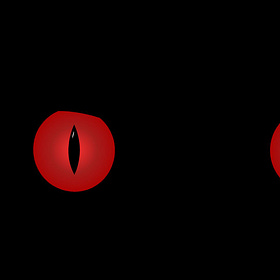The Devil's Advocate: Book VS Movie
Tags: Horror, Demons, The Devil’s Advocate
This is the last of 3 posts about The Devil’s Advocate. After reading the book and re-watching the 1997 movie adaptation, I decided to review both and then compare them. It’s now time for the comparison between book and movie. Warning: SPOILERS.
The plots are similar: an ambitious young lawyer is hired by a big law firm after winning a controversial case; he moves to New York with his wife, but slowly their dream becomes a nightmare as he realizes that his new boss could very well be the Devil himself. However, the way they’re developed is not, and there are some pretty big differences between book and movie.
Hell Spawn
In the book there's no big reveal about Kevin being the son of John Milton. It's implied that he could be his son - all the other lawyers are - but readers get no reaction to the possibility that he’s the son of the Devil himself. In the movie, there's a big confrontation that turns into almost incest, followed by suicide, and finally, a big fire as Milton loses it after Kevin refuses to be part of his plan.
These are very different approaches and frankly, I’m not sure which is better. Movie Milton was crap and his plan was ridiculous, but I would’ve liked to have seen Book Kevin really think about what Milton’s connection to the other lawyers meant in relation to him.
CORRUPTION
Kevin’s fall starts with that first case, but where the book opted for keeping things ambiguous, the movie couldn’t have made things more obvious.
In the book, the client is Lois Wilson, a young lesbian teacher, who keeps her composure throughout the trial and follows her lawyer’s instructions on how to behave. The first witness on the stand is the school principal, whose testimony throws some doubts on the proceedings so far. Only after this does Kevin talk to the accuser, young Barbara. That the accused is a woman helps make things look more uncertain. Later, Kevin will admit that his instincts told him Lois was guilty, but that’s not something he knew for sure. This makes the Stanley Rothberg case, with its clearly guilty defendant and false testimony, a step forward into the abyss for him, even if he tries to investigate further afterwards. That first case never goes away, though, and it haunts Kevin until the end. It’s that chipping away at his conscience and morality along with the fears for his safety that finally make him accept his role in the Devil’s plan.
In the movie, the client, Gettys, is a man, which, let’s face it, immediately makes you think he’s guilty. As if that weren’t bad enough, Kevin notices him creepily fondling the table as his accuser tells the court what he did to her. He’s so grossed out that he asks the judge for a break and leaves the courtroom. However, he still decides to defend Gettys and destroys the accuser’s testimony, thus winning the case. This not only makes him look like a worse person than his book counterpart, but also makes the Alex Cullen case a lot less important, especially since he didn’t even know about the 14 year old stepdaughter. If he had, at least it could’ve been seen as an opportunity for a do-over, but he only finds out about it later. Before this, Kevin gets to defend a voodoo worshipper, which is supposed to mean something, but frankly, I think it only works if you believe voodoo is a fake religion.
Then, there’s how the Kevins deal with their respective wives. Movie Kevin is given a raw deal as Mary Ann starts to lose it after noticing the supernatural weirdness around them. So, in addition to helping a child molester and a triple murderer (who’s also a child molester, though Kevin didn’t know it at the time) get away with it, he’s also a neglectful husband who ignores his increasingly fragile wife until she ends up killing herself in a mental institution. Book Kevin on the other hand, immediately notices changes in his wife, Miriam, even as she acts like she’s never been happier.
It’s ironic that Book Kevin comes across as more conflicted and less awful than Movie Kevin given their final choices, but he does. The way the movie decided to present that first case was a huge mistake, and also didn’t make much sense. Is the audience really supposed to believe that Gettys never acted creepy when he was being prepared for the trial? When it comes to the wives, Movie Kevin definitely looks worse, even if Book Kevin didn’t manage to save his wife, either.
THE DEVIL
In the movie adaptation, John Milton is aggressive, and even as he advises Kevin to be more subtle, he can’t stop flaunting his power in pretty obvious ways. Despite all this display, one of his employees actually threatens to betray him, though not to his face. Sure, Milton kills him before he can do it, but that it happened at all is pretty embarrassing. The movie portrayal is almost an inversion of the book version, who looks imposing but is much more subtle and manipulative. Even the rapes are done by deceit, with him taking the form of the husbands, rather than just violently assaulting the women like Movie Milton does to Mary Ann. The request for some extra details from the cases the lawyers are working on adds another layer of creepy to Book Milton; he’s clearly savouring Humanity’s evil. Movie Milton is more gross than creepy and lacks that sadism. Something else Book Milton has? The ability to inspire awe and blind loyalty, and if there are any attempted betrayals, they’re all part of his devious plan.
In this devilish battle, Book Milton wins hands down. Seriously, it’s not even a contest, which is funny as the other Milton is the one that gets the villain’s monologue, is directly identified with Lucifer, and openly displays his supernatural powers. Sure, the movie tries to convince the audience that Kevin’s victory wasn’t really a victory, but does Book Milton throw a hissy fit and burn everything down after that setback that wasn’t really a setback? Of course not; instead, he “dies” with a smile on his face because he won.
MARY ANN/MIRIAM
This is a tough one because the characters and their respective stories couldn’t be more different. The book gives readers a few chapters from Miriam’s POV, but for most of it, we only see her through Kevin’s eyes. While she supports her husband, she’s clearly upset by his defence of Lois Wilson and even asks him outright if he really thinks she’s innocent. In the beginning, Kevin hopes that she will keep him grounded after accepting the new job, but instead, she slowly changes, becoming just like the wives of his colleagues. She’s also used by John Milton to bring another one of his children into the world, though she doesn’t know the man she’s been having rough sex with isn’t really her husband. We know she’s doomed and in the final chapters, Kevin sees how the unborn baby is already taking over her personality, consuming her further.
Mary Ann doesn’t fare much better, though the audience gets to see her side of the story, which was partly conflated with Helen’s. So, instead of enjoying all that New York has to offer and having her mind enveloped by the demonic influences around her, she loses her mind as she gets glimpses of what’s lurking underneath the dreamy facade of her and Kevin’s new lives. Much like everything about the movie adaptation, the horror of her fate is more obvious, with her showing Kevin the scratches and bruises from Milton’s rape in a church before being taken to a mental institution where she’ll later slit her own throat. I still think things progressed too quickly, and that there should’ve been more supernatural weirdness, but at least you get to see her experiencing things.
Like I wrote in the beginning, it’s a difficult comparison, and there’s horror in both characters’ stories. Of course, Mary Ann got the showier story, but my problem with Miriam isn’t that things are more subtle, only that you don’t get to see her go through it.
THE MASTER PLAN
Book Milton never gets to monologue about his plan, but Father Vincent helpfully spells it out for poor, deluded Kevin:
Completely his own, of his essence. Children without conscience who could imagine things more evil than ordinary people…
Not only lawyers, but politicians, doctors, teachers, just as you suggest: everyone working within the system to corrupt the soul of mankind and defeat God Himself.
Kevin also has a place in all this, he just doesn’t know it until the end. It’s a sneaky, long term plan, that is already working very well in New York.
Movie Milton has a villain’s monologue and in addition to complaining about God’s negligence, he also mentions that bit about releasing criminals. However, his plans for Kevin are a little bit different. So, this Milton picked his 2 best children, Kevin and Christabella, to produce an heir to take over grandpa’s business. Why? Where is he going? Did he get tired of messing with God? As for the incest baby, it’s like someone looked at the Milton impregnating his sons’ wives while taking their form plot and said “Make it more incestuous but also sexy!”. The most shocking part of this plan, however, is that the audience is expected to accept that Lucifer would think someone could replace him. That seems a bit too humble for the guy who believed himself good enough to fight an omniscient, omnipotent, and omnipresent entity. Oh, and the whole coming to New York thing was a test and as soon as Kevin opts out, time resets and he goes back to the Gettys trial. Hmm, is Milton going to keep doing this until he agrees to knock up his half-sister? How long is he willing to wait? And why the Gettys trial? Unlike his book counterpart, whose first big case was Lois Wilson, Kevin had been a successful prosecutor who became an equally successful defence attorney, and, during her breakdown, Mary Ann says all his clients were guilty; so, why doesn’t Milton make his offer after one of the previous trials? And how does the time reset even work? Is the whole thing an illusion and Kevin is now stuck in a time loop where he’ll relive the same moment over and over again? Also, it’s pretty embarrassing that Movie Milton only managed to produce 2 good children - Book Milton has a whole army of them, all super competent and ready to do his bidding.
Movie Milton’s plan will never not be ridiculous, and while I also didn’t like how the movie ditched the book’s sneakier plan and the law firm’s focus on criminal law, it did a better job of showing Milton’s worldwide reach.
AND THE WINNER IS…
Both movie and book are flawed, but the book has better characters in general, and crucially in a story like this, a much better Devil.
By Danforth
Related Posts
Book Review: The Devil's Advocate
Spoilery review of Andrew Neiderman's horror book The Devil's Advocate.





